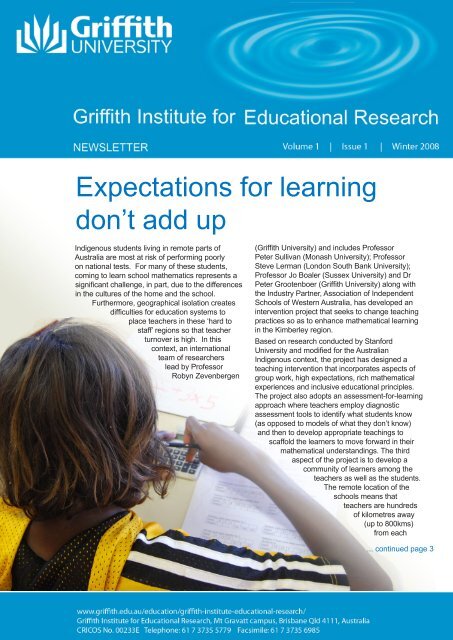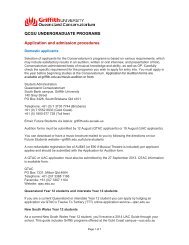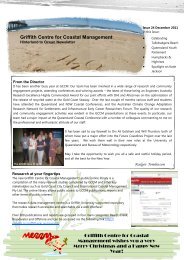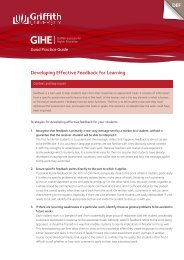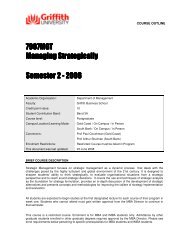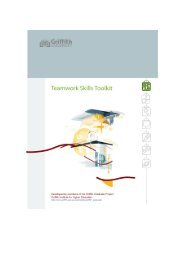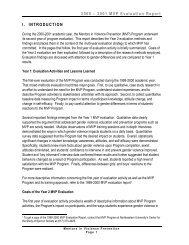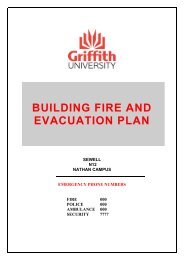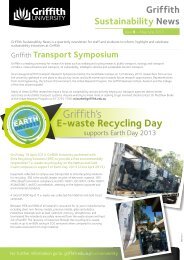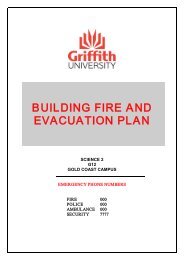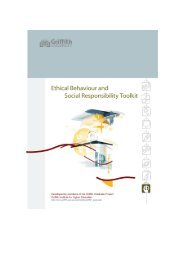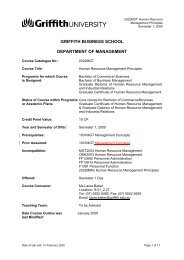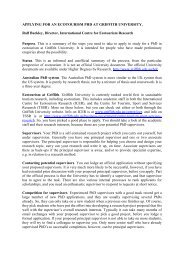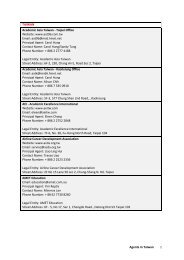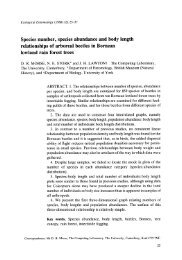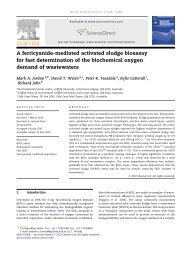Expectations for learning don't add up - Griffith University
Expectations for learning don't add up - Griffith University
Expectations for learning don't add up - Griffith University
Create successful ePaper yourself
Turn your PDF publications into a flip-book with our unique Google optimized e-Paper software.
Winter 2008 PAGE 1<br />
<strong>Expectations</strong> <strong>for</strong> <strong>learning</strong><br />
don’t <strong>add</strong> <strong>up</strong><br />
Indigenous students living in remote parts of<br />
Australia are most at risk of per<strong>for</strong>ming poorly<br />
on national tests. For many of these students,<br />
coming to learn school mathematics represents a<br />
significant challenge, in part, due to the differences<br />
in the cultures of the home and the school.<br />
Furthermore, geographical isolation creates<br />
difficulties <strong>for</strong> education systems to<br />
place teachers in these ‘hard to<br />
staff’ regions so that teacher<br />
turnover is high. In this<br />
context, an international<br />
team of researchers<br />
lead by Professor<br />
Robyn Zevenbergen<br />
(<strong>Griffith</strong> <strong>University</strong>) and includes Professor<br />
Peter Sullivan (Monash <strong>University</strong>); Professor<br />
Steve Lerman (London South Bank <strong>University</strong>);<br />
Professor Jo Boaler (Sussex <strong>University</strong>) and Dr<br />
Peter Grootenboer (<strong>Griffith</strong> <strong>University</strong>) along with<br />
the Industry Partner, Association of Independent<br />
Schools of Western Australia, has developed an<br />
intervention project that seeks to change teaching<br />
practices so as to enhance mathematical <strong>learning</strong><br />
in the Kimberley region.<br />
Based on research conducted by Stan<strong>for</strong>d<br />
<strong>University</strong> and modified <strong>for</strong> the Australian<br />
Indigenous context, the project has designed a<br />
teaching intervention that incorporates aspects of<br />
gro<strong>up</strong> work, high expectations, rich mathematical<br />
experiences and inclusive educational principles.<br />
The project also adopts an assessment-<strong>for</strong>-<strong>learning</strong><br />
approach where teachers employ diagnostic<br />
assessment tools to identify what students know<br />
(as opposed to models of what they don’t know)<br />
and then to develop appropriate teachings to<br />
scaffold the learners to move <strong>for</strong>ward in their<br />
mathematical understandings. The third<br />
aspect of the project is to develop a<br />
community of learners among the<br />
teachers as well as the students.<br />
The remote location of the<br />
schools means that<br />
teachers are hundreds<br />
of kilometres away<br />
(<strong>up</strong> to 800kms)<br />
from each<br />
... continued page 3
PAGE 2<br />
GRIFFITH INSTITUTE FOR EDUCATIONAL RESEARCH NEWSLETTER<br />
Editorial<br />
Welcome to the first edition of the <strong>Griffith</strong> Institute <strong>for</strong><br />
Educational Research (GIER) newsletter. The newsletter<br />
will be a quarterly feature, with issues in Winter, Spring,<br />
Summer and Autumn. Through this newsletter, we will<br />
share the successes of members with our community.<br />
August 2008 will mark the first anniversary of the<br />
establishment of the Institute with members across all<br />
campuses of <strong>Griffith</strong> <strong>University</strong>. In that time, there have<br />
been many successes of the members. These will be<br />
profiled in the coming editions. Each edition will include<br />
stories on current research projects being managed<br />
by GIER members; successes and profiles of research<br />
students; publications; profiles of members; and<br />
important diary dates.<br />
GIER members research major issues related to<br />
<strong>learning</strong>, focusing particularly on issues impacting on<br />
<strong>learning</strong> in a rapidly changing world and how individuals<br />
and communities can be assisted to learn to engage<br />
effectively with social change.<br />
In the coming months, GIER will be s<strong>up</strong>porting a range<br />
of activities including our first Research Higher Degree<br />
conference in October; a range of workshops to s<strong>up</strong>port<br />
quality publications and develop partnerships with<br />
industries relevant to the various research interests of<br />
members; and a<br />
range of public<br />
seminars featuring<br />
prominent<br />
speakers in<br />
the area of<br />
<strong>learning</strong> and<br />
social change.<br />
The Institute is<br />
currently planning<br />
a showcase of<br />
research projects<br />
stemming from<br />
successful grants<br />
over the past<br />
three years.<br />
GIER is keen to<br />
s<strong>up</strong>port initiatives<br />
that will emerge<br />
into “Signature<br />
Projects” with<br />
strong industry<br />
Professor Robyn Zevenbergen<br />
Director, <strong>Griffith</strong> Institute <strong>for</strong><br />
Educational Research<br />
collaborations. These Projects will be focussed on<br />
significant issues related to <strong>learning</strong> and social change.<br />
<strong>Griffith</strong> Institute <strong>for</strong> Educational<br />
Research newsletter<br />
is the newsletter of the <strong>Griffith</strong> Institute <strong>for</strong><br />
Educational Research<br />
<strong>Griffith</strong> <strong>University</strong><br />
Mt Gravatt campus<br />
Brisbane Qld 4111 Australia<br />
www.griffith.edu.au/education/griffith-instituteeducational-research/<br />
If you would like your <strong>learning</strong> and social change<br />
related activities to be featured in this newsletter,<br />
please contact the publisher:<br />
Mrs Jill Moriarty, Manager<br />
Telephone: 61 7 3735 5822<br />
Facsimile: 61 7 3735 6985<br />
Email: j.moriarty@griffith.edu.au<br />
or Professor Robyn Zevenbergen, Director<br />
Telephone 61 7 3735 6973<br />
Facsimile: 61 7 3735 6985<br />
Email: r.zevenbergen@griffith.edu.au<br />
Research examines eLearning in<br />
schools in Taiwan<br />
Associate Professor Pei Chen Sun from the Institute<br />
<strong>for</strong> In<strong>for</strong>mation and Computer Education, National<br />
Kaohsiung Normal <strong>University</strong>, Taiwan will be a Visiting<br />
Scholar located in the School of Education and<br />
Professional Studies Gold Coast from 15 August until 13<br />
September 2008.<br />
Collaborative research with GIER member, Dr Glenn<br />
Finger will be undertaken examining eLearning,<br />
including research on eLearning in schools in Taiwan.<br />
The outcome of this research will be incorporated in<br />
the book The Home School Nexus – The Development<br />
of Networked School Communities, currently under<br />
contract, being co-authored by Mal Lee and Dr Glenn<br />
Finger.<br />
The real value and strength Sun brings is not only his<br />
work and projects on eLearning in Taiwan (a world leader<br />
in ICT), but his advanced knowledge and application of<br />
quantitative research methodologies.<br />
IN THIS ISSUE<br />
• PARTNERSHIPS<br />
• EVENTS<br />
• RESEARCH<br />
• MEMBER PROFILES<br />
• STUDENT PROFILES<br />
• PUBLICATIONS<br />
• MEMBERS’ NEWS<br />
• VISITORS
Winter 2008 PAGE 3<br />
<strong>Expectations</strong> <strong>for</strong> <strong>learning</strong> don’t <strong>add</strong> <strong>up</strong><br />
... continued from page 1<br />
other so collaborations and discussions are often very<br />
limited. The project is developing an on-line community<br />
(www.kimberleymaths.org) where teachers are able<br />
to communicate with each other. In this <strong>for</strong>um, the<br />
resources that are developed through the project are<br />
kept in the on-line environment so that future teachers<br />
will be able to draw on the rich data bank of resources<br />
that will be developed throughout the project.<br />
The project is working with 6 schools in the east Kimberley<br />
region with most schools being in the Fitzroy basin. In<br />
the wet season, many of the communities are isolated <strong>for</strong><br />
months by the flooded Fitzroy River. The schools serve<br />
the early years of schooling through to Year 10. Many of<br />
the local people are involved in the project and participate<br />
in the in-service activities. The project works across all<br />
years of schooling and has approximately 30 teaching<br />
staff as participants. All AISWA schools in the region are<br />
participating in the study.<br />
The project is funded through the Australian Research<br />
Council’s Linkage Grant scheme <strong>for</strong> 4 years with AISWA<br />
as the Industry Partner.<br />
Indigenous community<br />
participation in health<br />
education decision making<br />
Dr Sue Whatman, a Visiting Scholar from the<br />
Queensland <strong>University</strong> of Technology will be publishing<br />
from her research, and exploring research collaborations<br />
in the area of Indigenous education.<br />
Dr Whatman presented a seminar on the 17th June on<br />
the research protocols, methodological considerations<br />
and stages of critical ethnographic case study used in<br />
an investigation into the nature and extent of Indigenous<br />
community participation in school health education<br />
decision making, specifically <strong>for</strong> girls.<br />
The full investigation, conducted over three years,<br />
was concerned with identifying stakeholders in health<br />
education <strong>for</strong> girls, describing the ways in which<br />
stakeholders participated in health education decision<br />
making, and identifying the factors that promoted or<br />
inhibited community participation. It was in<strong>for</strong>med by two<br />
personal standpoints: firstly, that Indigenous communities<br />
would want to participate in education decision-making<br />
and, secondly, that community participation would be<br />
desirable in producing good outcomes <strong>for</strong> Indigenous<br />
students.
PAGE 4<br />
GRIFFITH INSTITUTE FOR EDUCATIONAL RESEARCH NEWSLETTER<br />
Making a contribution to Action Research<br />
<strong>Griffith</strong> Institute <strong>for</strong> Educational Research (GIER) and<br />
the Action Learning and Action Research Association<br />
(ALARA) co-hosted a book launch in May to celebrate<br />
the completion and publication of a research book titled,<br />
“Evaluating Action Research” which was co-edited by<br />
Eileen Piggot-Irvine from Unitec Institute of Technology,<br />
Auckland and GIER member, Brendan Bartlett.<br />
Professor Bob Dick, Southern Cross <strong>University</strong>, Tweed<br />
Heads, <strong>Griffith</strong> <strong>University</strong> Adjunct Professor and coeditor<br />
of Action Research International online journal<br />
presented a critical overview of the text as part of the<br />
official launch, indicating it had <strong>add</strong>ressed key issues<br />
and filled an important gap in the field with its theme of<br />
self-critical review. He noted the introductory chapter as<br />
an excellent reference <strong>for</strong> anyone interested in <strong>learning</strong><br />
about the field and saw as a particular strength that each<br />
chapter included an appraisal of the methodology within<br />
Below: Co-editors, Associate Professor Brendan<br />
Bartlett (<strong>Griffith</strong> Institute <strong>for</strong> Educational Research)<br />
and Eileen Piggot-Irvine (Unitec Institute of<br />
Technology, Auckland) at the recent launch of their<br />
book “Evaluating Action Research”.<br />
the specific contexts of the various reported projects.<br />
Professor Dick said that the collection had highlighted<br />
Australian and New Zealand leadership in action<br />
research.<br />
Contributing authors included:<br />
Brendan Bartlett, Faculty of Education, <strong>Griffith</strong> <strong>University</strong>,<br />
Brisbane; David Ballantyne, Department of Marketing,<br />
<strong>University</strong> of Otago, Dunedin; Carol Cardno, Unitec<br />
Institute of Technology, Auckland; Margaret Fletcher,<br />
Faculty of Education, <strong>Griffith</strong> <strong>University</strong>, Brisbane; Deepa<br />
Marat, Unitec Institute<br />
of Technology, Auckland;<br />
Eileen Piggot-Irvine, Unitec<br />
Institute of Technology,<br />
Auckland; Ernest Stringer,<br />
Curtin <strong>University</strong> of<br />
Technology, Perth; Ortrun<br />
Zuber-Skerritt, Faculty<br />
of Education, <strong>Griffith</strong><br />
<strong>University</strong>, Brisbane.
Winter 2008 PAGE 5<br />
Acknowledging excellence in educational research<br />
GIER members Professor John Stevenson and Professor<br />
Merv Hyde retired from the School of Education and<br />
Professional Studies, but will continue to contribute to<br />
educational research as Adjunct members of the Institute.<br />
As founding director of Centre <strong>for</strong> Learning Research,<br />
John has been a strong leader in educational research<br />
within <strong>Griffith</strong>, particularly in researching and theorising<br />
<strong>learning</strong>. John has also been involved in a number of<br />
other Centres within the Faculty of Education, including<br />
those in the area of vocational education. Similarly Merv<br />
was heavily involved in deafness research and was<br />
instrumental in the Centre <strong>for</strong> Deafness Studies. We wish<br />
both John and Merv a very happy and enjoyable retirement<br />
and look <strong>for</strong>ward to their continued involvement in GIER.<br />
Right: GIER members, Professor John Stevenson<br />
(left) and Professor Merv Hyde (right).<br />
Bridging gaps in music teacher education<br />
GIER member, Dr Julie Ballantyne is the Lead Chief<br />
Investigator of a Carrick Competitive Grant which<br />
involves the development of a website that aims<br />
to bridge the gaps between research and teaching<br />
in music teacher education and decrease isolation<br />
between academics, teachers and pre-service<br />
teachers.<br />
The project Music Teachers Oz has been developed in<br />
response to research suggesting that music courses<br />
are overly theory-based rather than student-focused<br />
and that in general early-career music teachers<br />
are dissatisfied with the pre-service education they<br />
receive. As part of a funded <strong>learning</strong> and teaching<br />
grant, academics from four universities developed<br />
a new approach to music teacher education which<br />
utilises problem-based <strong>learning</strong> and assessment. The<br />
project aims to provide explicit links between courses<br />
studied at university, and between the school and<br />
university environment. As part of the project a website<br />
was developed and launched under the web <strong>add</strong>ress<br />
www.musicteachersoz.org. Its design incorporates<br />
the use of ‘rooms’ to allow people to navigate around<br />
the site. The project room includes in<strong>for</strong>mation about<br />
the project, publications and resources <strong>for</strong> music<br />
education. The context room currently features 15 case<br />
studies showing teachers responding to questions about<br />
their teaching context and raising problems which need<br />
to be solved. In the student room pre-service teachers<br />
have access to discussion boards, a reflective journal,<br />
dreaming room, project wiki, and an online chat room<br />
to corporately investigate and solve the given teaching<br />
‘problems’. Academics can meet in the research room <strong>for</strong><br />
online discussions and reflection.<br />
The website’s popularity with non-students was an<br />
unexpected strength of the project. However, the lively<br />
use of this ‘public’ space demonstrates substantial<br />
interest in music education and indicates that this<br />
website can be used as a resource <strong>for</strong> pre-service<br />
students and teachers alike.<br />
The website currently has over 1700 people signed<br />
<strong>up</strong> who are regularly accessing the site engaging in<br />
student and public <strong>for</strong>ums. The website’s members are<br />
located in all States in Australia. The project also has<br />
been attracting great international interest with members<br />
coming from New Zealand, Hong Kong, Switzerland,<br />
Canada, Thailand, United Arabic Emirates and the<br />
United States of America.<br />
For more in<strong>for</strong>mation, please visit the site at www.<br />
musicteachersoz.org/.
PAGE 6<br />
GRIFFITH INSTITUTE FOR EDUCATIONAL RESEARCH NEWSLETTER<br />
Building research capacity in South Africa<br />
Above: Ms Ortrun Zuber-<br />
Skerritt, <strong>Griffith</strong> Institute<br />
<strong>for</strong> Educational Research<br />
Adjunct member.<br />
<strong>Griffith</strong> Institute<br />
<strong>for</strong> Educational<br />
Research (GIER)<br />
Adjunct Professor,<br />
Ortrun Zuber-Skerritt,<br />
recently conducted two<br />
residential professional<br />
development programs<br />
in higher education<br />
through Action<br />
Learning and Action<br />
Research Association<br />
(ALARA) in South<br />
Africa with colleagues<br />
from the <strong>University</strong> of<br />
Stellenbosch.<br />
The first was a<br />
four-day research<br />
retreat with nine local<br />
female academics<br />
in the Curriculum<br />
Development and<br />
S<strong>up</strong>port Unit (CDS) at the Tshwane <strong>University</strong> of<br />
Technology (TUT) in Pretoria. The aims were to help<br />
these women to build research capacity in their fiveyear<br />
scholarship-based project on aspects of “access,<br />
retention and success of students in TUT”; and in<br />
particular to develop their ability to write a literature<br />
review and research proposal <strong>for</strong> a higher degree or<br />
grant application.<br />
These women had been teachers in historically<br />
disadvantaged institutions of higher education<br />
(so-called technikons) be<strong>for</strong>e the merger<br />
into TUT. They were placed in leadership<br />
positions in a central research and development unit<br />
in this new university, charged with improving <strong>learning</strong>,<br />
teaching and curriculum design in the whole university<br />
with no experience in the area. Yet these women are<br />
extremely motivated and committed.<br />
The second residential professional development<br />
program was the result of a successful grant application<br />
to AusAID funding a three-day leadership development<br />
program in Stellenbosch <strong>for</strong> project teams working on<br />
various aspects of the central theme “poverty reduction<br />
and improvement of practice in the health sciences and<br />
education” using ALARA methodology. The program<br />
brought together 24 program participants from six African<br />
countries. GIER member, Associate Professor Brendan<br />
Bartlett also facilitated a session on Evaluation.<br />
Three teams from Kenya, Tanzania and Uganda<br />
received funding <strong>for</strong> travel and accommodation from<br />
AusAID through its Seminar S<strong>up</strong>port Scheme (SSS),<br />
with sponsorship by OZI (Ortrun Zuber International Pty<br />
Ltd), the <strong>University</strong> of Stellenbosch (Centre <strong>for</strong> Adult<br />
and Higher Education) and <strong>Griffith</strong> <strong>University</strong> (GIER).<br />
Self- and other-funded individuals and teams from<br />
South Africa, Malawi and Mozambique, who were also<br />
interested in this theme, were accepted into the program<br />
by our colleagues in Stellenbosch.<br />
All facilitators and participants have been invited to<br />
contribute to a book on “Improving Practice <strong>for</strong> Poverty<br />
Reduction through Action Research: Leadership<br />
Development in African Countries”. In <strong>add</strong>ition to this,<br />
a joint paper on “Meta-action research on a leadership<br />
development program in Africa” will be submitted <strong>for</strong><br />
publication to integrate research and development as<br />
reflective practitioners and action researchers.
Winter 2008 PAGE 7<br />
Sustaining older workers’ competence<br />
A <strong>Griffith</strong> <strong>University</strong> research project will identify<br />
practices <strong>for</strong> workplaces and educational institutions<br />
to sustain and develop the skills of Australia’s growing<br />
number of older workers. <strong>Griffith</strong> Institute <strong>for</strong> Educational<br />
Research member and program leader, Professor<br />
Stephen Billett says maintaining the effective working life<br />
of older Australian workers is essential <strong>for</strong> sustaining the<br />
economic and social health of the nation. “It’s important<br />
<strong>for</strong> older people’s sense of workplace efficacy and sense<br />
of self as productive members of the community,’’ he<br />
said.<br />
In most advanced industrial economies, if you are<br />
working and over 45 years of age, you are classified<br />
as an ‘older worker’. Yet, <strong>for</strong> many older workers,<br />
this categorisation brings a range of ambiguities and<br />
contradictions.<br />
In countries like Australia, the realisation of key social<br />
and economic goals is becoming increasingly dependent<br />
<strong>up</strong>on an older work<strong>for</strong>ce. This is because older workers<br />
comprise a growing percentage of the nation’s work<strong>for</strong>ce.<br />
There is a decline in the number of workers entering the<br />
work<strong>for</strong>ce, and people are electing or will have to work<br />
longer. The reality is that to sustain the quality and extent<br />
of the nation’s goods and services, the competence<br />
of these older workers will need to be maintained and<br />
sustained, <strong>for</strong> longer. Like other categories of workers,<br />
these workers also need to maintain that competence<br />
in face of constant changes to work and ways of<br />
working. Yet, in the provision of opportunities <strong>for</strong> further<br />
development and advancement employers tend to<br />
overlook older workers. The preference is <strong>for</strong> s<strong>up</strong>porting<br />
and promoting younger and well-qualified workers.<br />
This preference may well continue as younger workers<br />
increasingly become a scarce commodity.<br />
Working with colleagues from the <strong>University</strong> of Stirling,<br />
this International Linkage project seeks to identify ways<br />
to sustain older workers’ occ<strong>up</strong>ational competence<br />
through a program of collaborative research in Australia<br />
and Britain. Both countries have unresolved concerns<br />
about maintaining the effectiveness of older workers<br />
and developing their capacities to manage their<br />
transitions to new work, ways of working and current<br />
work requirements. The project aims to: (i) in<strong>for</strong>m<br />
policy and practice <strong>for</strong> both countries’ workplaces<br />
and education institutions to effectively maintain older<br />
workers’ capacities and managing work transitions; (ii)<br />
identify appropriate <strong>learning</strong> strategies and curriculum<br />
practices <strong>for</strong> these purposes in both workplaces and<br />
educational institutions; (iii) identify, evaluate and share<br />
instances of good practice in workplaces and educational<br />
programmes; and (iv) develop effective institutional<br />
responses to this shared problem. To realise these aims,<br />
older workers’ competence in each country, two industry<br />
sectors will be investigated in Australia compatible with<br />
the British counterpart program. Within each industry<br />
sector, there will be 30 interviews and five focus gro<strong>up</strong>s<br />
with older workers to identify key factors shaping the<br />
prospects <strong>for</strong> older workers’ continuing workplace<br />
competence. These factors will be elaborated through<br />
<strong>up</strong> to six case studies. Then, a survey will be undertaken<br />
across a wider cohort of older workers to verify the<br />
plausibility of what has been identified in these earlier<br />
activities.
PAGE 8<br />
GRIFFITH INSTITUTE FOR EDUCATIONAL RESEARCH NEWSLETTER<br />
In the spotlight: profiling our staff<br />
Professor Stephen Billett<br />
Above: Professor Stephen Billett, PHD, M Education,<br />
B Arts, Dip Teaching (TAFE), Professor of Education<br />
and GIER Member.<br />
Dr Julie Ballantyne<br />
Dr Julie Ballantyne completed her PhD in music teacher<br />
education in 2005 and has been a lecturer in the School of<br />
Education and Professional Studies at the Gold Coast campus<br />
since July last year. Julie is on the editorial board of the<br />
International Journal of Music Education, and is the editor of<br />
a <strong>for</strong>thcoming book to be published by Cambridge Scholars<br />
Publishing entitled Navigating Music and Sound Education.<br />
Julie is the Lead Chief Investigator of an Australian Learning<br />
and Teaching Council (<strong>for</strong>merly Carrick) Competitive Grant,<br />
that aims to bridge the gap between research and teaching<br />
in music teacher education and decrease isolation between<br />
academics, teachers and pre-service teachers.This project will<br />
hopefully be extended in 2009-2010 with a Leadership Grant<br />
funded by the ALTC to further build a community of educators<br />
dedicated to collaboratively developing improved structures,<br />
networks and practices in the discipline of music teacher<br />
education. The <strong>Griffith</strong> <strong>University</strong> Research Infrastructure<br />
Grant ‘eMERGe’ was funded last year and involves the<br />
building of a ‘hub’ in music education research, enabling<br />
academics worldwide to collaborate on research, and discuss<br />
their emerging ideas with the wider community.<br />
Julie is presenting five workshops and papers at the<br />
International Society of Music Education Conference and<br />
Commission seminars in Rome and Bologna, Italy. Julie<br />
plans to extend her research into exploring the nexus between<br />
musical engagement, identity, and its impact on social and<br />
psychological well-being.<br />
Professor Stephen Billett has researched <strong>learning</strong><br />
through and <strong>for</strong> work since 1992 and has published<br />
widely in the fields of vocational <strong>learning</strong>, workplace<br />
<strong>learning</strong> and conceptual accounts of <strong>learning</strong>. These<br />
include publications in Culture and Psychology, Learning<br />
and Instruction and Mind, Culture and Activity, Studies in<br />
Continuing Education and as well as sole authored books<br />
(Learning through work: Strategies <strong>for</strong> effective practice<br />
(Allen and Unwin 2001); Work, change and workers<br />
(Springer 2006); and edited volume (Work, Subjectivity<br />
and Learning; Emerging perspectives of workplace<br />
<strong>learning</strong>) secured over $1.5 million in competitively<br />
funded grants from Australian Research Council, National<br />
Vocational Educational and Training Research funds,<br />
Fulbright Foundation, state and private sector. He<br />
also holds a Fellowship of the Australian Teaching and<br />
Learning Council (<strong>for</strong>merly Carrick Institute).<br />
Professor Billett is currently on the editorial boards of<br />
7 refereed journals, including the American Education<br />
Research Journal, the second most cited journal in the<br />
field, and he reviews articles <strong>for</strong> many other journals.<br />
He is the Founding and Executive Editor of Vocations<br />
and Learning, a journal of professional and vocational<br />
education published by Springer.<br />
Below: Dr Julie Ballantyne, B Music, B Education,<br />
A.Mus.A. PhD, Lecturer, School of Education and<br />
Professional Studies and GIER Associate Member.
Winter 2008 PAGE 9<br />
Profiling our students<br />
Shawn Lourigan recently completed his PhD confirmation<br />
Above: PhD student, Shawn Lourigan BA (Hons)<br />
PGDipED MVA.<br />
Dr Wayne Usher recently graduated with his PhD<br />
Dr Wayne Usher has a Diploma of Teaching, Graduate<br />
Diploma in Health Science, Master of Health Science,<br />
and recently completed his PhD on Empire and the<br />
‘Internet Prescription’: Influences that motivate general<br />
practitioners to recommend health websites to the health<br />
consumer. In the first Australian study of its kind, Wayne<br />
surveyed 108 Gold Coast general practitioners as part<br />
of his PhD research to determine the extent to which<br />
health websites are being recommended by general<br />
practitioners to the health consumer.<br />
Wayne is now an Associate Lecturer in the School<br />
of Education and Professional Studies (Gold Coast).<br />
His research interests include school and community<br />
health, physical education, medical education, general<br />
practitioners and the internet. Current studies include<br />
online health in<strong>for</strong>mation and the impacts of health<br />
websites on general practitioners and the health<br />
consumer.<br />
Wayne’s future research interests will be to undertake<br />
a nationwide survey to determine the extent to which<br />
health websites are being recommended by general<br />
practitioners to the health consumer. Similarly, he is<br />
interested in investigating the online health in<strong>for</strong>mation<br />
seeking behaviours of school aged children.<br />
Shawn Lourigan completed his Bachelor of Arts degree<br />
in 1995, majoring in English Literature and Modern<br />
History. In 1996 he obtained his secondary teacher<br />
qualifications from the <strong>University</strong> of Queensland. Shawn<br />
completed his Honours degree at Queensland <strong>University</strong><br />
of Technology in 1997 with an examination of the<br />
causality of the troubles in Northern Ireland. He has also<br />
completed a Masters in Visual Arts (Documentary) from<br />
<strong>Griffith</strong> Film School. For the past ten years Shawn has<br />
worked as a secondary school teacher <strong>for</strong> Education<br />
Queensland, teaching in the areas of Humanities and<br />
Social Sciences.<br />
Under the s<strong>up</strong>ervision of Associate Professor Rod<br />
Gardner (<strong>Griffith</strong> Institute <strong>for</strong> Education Research) and<br />
Professor Mohammed Abdalla (<strong>Griffith</strong> Islamic Research<br />
Unit) Shawn is currently undertaking research <strong>for</strong> his<br />
PhD on “Political Statements And Their Impact On<br />
Islamic Representations In The Australian Media Post<br />
9/11”.<br />
Shawn’s research will examine the role that political<br />
commentary, combined with the tabloid print media,<br />
have had in inflaming anti-Islamic sentiment in Australia<br />
and what future consequences these policies will have<br />
on the Muslim community in Australia.<br />
Below: Dr Wayne Usher, Dip Teaching, GDip Health<br />
Science, M Health Science, PhD, Associate Lecturer,<br />
School of Education and Professional Studies.<br />
“Many health professionals would be willing to undertake<br />
certified web-based continuing medical education<br />
courses,” he said.<br />
“The inclusion of programs in medical schools is a<br />
possible strategy <strong>for</strong> preparing future GPs <strong>for</strong> internet<br />
prescribing.<br />
“These are important initiatives towards creating a more<br />
reliable and safer e-health environment <strong>for</strong> all.”
PAGE 10<br />
GRIFFITH INSTITUTE FOR EDUCATIONAL RESEARCH NEWSLETTER<br />
Exploring Technology Education conference<br />
The 5th Biennial<br />
International Conference<br />
on Technology Education<br />
Research “Exploring<br />
Technology Education:<br />
Solutions to issues in a<br />
Globalised World” will be held<br />
from 27-29 November 2008 at the<br />
Crowne Plaza Hotel, Surfers Paradise,<br />
Gold Coast, Queensland, Australia.<br />
Keynote speakers include David<br />
Johnston (Ox<strong>for</strong>d <strong>University</strong>), Clare Benson<br />
(Birmingham City <strong>University</strong>), and Judith<br />
Moreland (Waikato <strong>University</strong>).<br />
Delegates will come from a wide range of<br />
technology education stakeholders - teacher<br />
educators, teachers, researchers, post-graduate<br />
students, policy makers, curriculum developers,<br />
consultants, and members of the broader educational<br />
community.<br />
Members’ news<br />
Evaluating the Canadian Council of Learning<br />
Professor Stephen Billett has been appointed to the<br />
Expert Panel that provides an evaluation of the Canadian<br />
Council of Learning, a C$85 million initiative of the<br />
Canadian government, and will prepare a report that<br />
identifies its worth and possible alternative structures<br />
and programs to realise goals associated with lifelong<br />
<strong>learning</strong> <strong>for</strong> Canadians.<br />
Developing a comprehensive reference resource<br />
on in<strong>for</strong>mation communication technologies<br />
Dr Glenn Finger co-authored a chapter that was selected<br />
<strong>for</strong> inclusion in the six volume definitive resource<br />
on in<strong>for</strong>mation communication<br />
technologies representing ‘the most<br />
comprehensive reference work in<br />
this field…[covering] such topics<br />
as ad-hoc networks, collaborative<br />
environments, e-governance, and<br />
urban in<strong>for</strong>mation systems’.<br />
Measuring the quality of work integrated <strong>learning</strong><br />
Dr Calvin Smith has been awarded a <strong>Griffith</strong> <strong>University</strong><br />
Research Grant (GURG) to develop and validate<br />
measures of key quality indicators <strong>for</strong> Work Integrated<br />
Learning (WIL) curricula.<br />
Registration closes 12 October 2008.<br />
For more in<strong>for</strong>mation or to download a<br />
registration <strong>for</strong>m, please visit www.griffith.edu.<br />
au/education/griffith-institute-educational-research/<br />
events/technology-education-research-conference2.<br />
Influencing policy on deafness and human rights<br />
Professor Merv Hyde delivered the keynote <strong>add</strong>ress at<br />
the Nordic Conference on The dual languages of deaf<br />
and hearing-impaired children in Gothenburg, Sweden.<br />
His topic was Deafness and Human Rights: How the<br />
2007 UN Convention on the Rights of Persons with<br />
Disabilities may influence current policies and programs.<br />
Exploring research collaboration with Indonesia<br />
Professor Howard Middleton met with a delegation from<br />
Gadjah Mada <strong>University</strong> (UGM), Indonesia to discuss the<br />
activities of the <strong>Griffith</strong> Institute <strong>for</strong> Educational Research<br />
and explore the possibilities <strong>for</strong> research collaboration.<br />
Maths Education Research Journal editorship<br />
GIER Director, Professor Robyn Zevenbergen, and<br />
GIER members, Dr Peter Grootenboer and Dr Ray<br />
Brown have been successful in securing the editorship<br />
of MERJ (Mathematics Education Research Journal) <strong>for</strong><br />
a three year period commencing 1 July 2008. MERJ is<br />
an international refereed journal that provides a <strong>for</strong>um <strong>for</strong><br />
the publication of research on the teaching and <strong>learning</strong><br />
of mathematics at all levels.
Winter 2008 PAGE 11<br />
Recent publications<br />
Professor Stephen Billett<br />
Billett, S. (2008) “Adult Education – adult <strong>learning</strong>,<br />
instruction and program planning: Workplace <strong>learning</strong><br />
frameworks” in E. Baker, B. McGaw and P. Peterson (eds)<br />
International Encyclopaedia of Education, 3rd Edition,<br />
Elsevier: Ox<strong>for</strong>d.<br />
Billett, S. (2008) “Changing conceptions of work and work<br />
practice” in R. Maclean, D.N. Wilson and C. Chinien (eds)<br />
International Handbook on Education <strong>for</strong> the World of Work,<br />
Springer Academic Publication, Dordecht, The Netherlands.<br />
Billett, S. (2008) “Integrating contributions of workplace<br />
and college experiences in developing vocational<br />
knowledge” in R. Maclean, D.N. Wilson and C. Chinien<br />
(eds) International Handbook on Education <strong>for</strong> the World<br />
of Work, Springer Academic Publication, Dordecht, The<br />
Netherlands.<br />
Billett, S. (2008) “Trans<strong>for</strong>ming Teachers’ Practice Through<br />
Action Learning” in R. Maclean, D.N. Wilson and C. Chinien<br />
(eds) International Handbook on Education <strong>for</strong> the World<br />
of Work, Springer Academic Publication, Dordecht, The<br />
Netherlands.<br />
Billett, S. (2008) “The Technical, Vocational Education and<br />
Training Profession” in R. Maclean, D.N. Wilson and C.<br />
Chinien (eds) International Handbook on Education <strong>for</strong> the<br />
World of Work, Springer Academic Publication, Dordecht,<br />
The Netherlands.<br />
Billett, S., Barker, M. and Smith, R. (2008) “Relational<br />
interdependence as means to examine work, <strong>learning</strong> and<br />
the remaking of cultural practices” in Wim J. Nijhof and<br />
Loek F.M. Nieuwenhuis (eds) The <strong>learning</strong> potential of the<br />
workplace, Sense Publishers, Dordecht, The Netherlands.<br />
Billett, S. (2008) “Rich vocational <strong>learning</strong>: Effectively<br />
utilising workplace settings and integrating them with<br />
intentional educational experiences” in Athanasou, J. (ed)<br />
Adult Education and Training, David Barlow Publishing,<br />
Sydney NSW (pp.175-186).<br />
Billett, S. (2008) “Participation and <strong>learning</strong> in turbulent<br />
times: Negotiations between the community and the<br />
personal” in K. Church, N. Bascia and E. Shragge (eds)<br />
Out of Bounds: Participatory Practices <strong>for</strong> Learning through<br />
Community, (21-36) Springer Academic Publication,<br />
Dordecht, The Netherlands. ISBN 978-1-4020-6653-5.<br />
Billett, S. (2008) “Learning throughout working life: A<br />
relational interdependence between social and individual<br />
agency” British Journal of Education Studies, 55 (1) 39-58.<br />
Billett, S. and van Woerkom, M. (2008) “Personal<br />
epistemologies and older workers” International Journal of<br />
Lifelong Learning, 27 (3) 333-348.<br />
Vähäsantanen, K. and Billett, S. (2008) “Negotiating<br />
professional identity: vocational teachers’ personal<br />
strategies in a re<strong>for</strong>m context” in S. Billett, C. Harteis and A.<br />
Eteläpelto, (eds) Emerging perspectives of <strong>learning</strong> through<br />
work. Sense Publishing, BV, Rotterdam, The Netherlands.<br />
Associate Professor Brendan Bartlett<br />
Piggot-Irvine, E. and Bartlett, B. J. (eds) (2008)<br />
Evaluating Action Research, New Zealand Research<br />
Council: Auckland, New Zealand.<br />
Dr Glenn Finger<br />
Finger, G., McGlasson, M., and Finger, P. (2008).<br />
“In<strong>for</strong>mation and Communication Technologies: Towards<br />
a Mediated Learning Context” in Craig Van Slyke (Ed.),<br />
In<strong>for</strong>mation Communication Technologies: Concepts,<br />
Methodologies, Tools, and Applications, IGI Global.<br />
Sun, P., Tsai, R.J., Finger, G., Chen, Y., & Yeh, D.<br />
(2008). “What drives a successful e-Learning? An<br />
empirical investigation of the critical factors influencing<br />
learner satisfaction” Computers and Education, Elsevier.<br />
Vol. 50, Issue 4, pp. 1103-1586.<br />
Dr Margaret Fletcher<br />
Fletcher, M. and Zuber-Skerritt, O. (2008) “Professional<br />
development through action research: Case studies in<br />
South African higher education” Systemic Practice and<br />
Action Research, 21: 73–96.<br />
Dr Michael Haugh<br />
Haugh, Michael (ed) (2008) “Intention in pragmatics”.<br />
Special issue of Intercultural Pragmatics, 5, 2: 99-260<br />
(Mouton de Gruyter).<br />
Haugh, Michael (2008) “Intention in pragmatics”,<br />
Intercultural Pragmatics, 5, 2: 99-110.<br />
Haugh, Michael (2008) “Intention and diverging<br />
interpretings of implicature in the “uncovered meat”<br />
sermon”, Intercultural Pragmatics, 5, 2: 201-230.<br />
Haugh, Michael (2008) “The discursive negotiation of<br />
international student identities”, Discourse: Studies in the<br />
Cultural Politics of Education, 29, 2: 207-222.<br />
Professor Mervyn Hyde<br />
Hyde, M. and Hoie, G. (2008) Constructing educational<br />
discourses on deafness, Norwegian Government<br />
Printers: Skadalen Resource Centre, Oslo Norway ISBN<br />
978-82-9165527-7.<br />
Dr Calvin Smith<br />
Smith C.D. (2008) “Building effectiveness in teaching<br />
through targeted evaluation and response: connecting<br />
evaluation to teaching improvement in higher education”<br />
Assessment and Evaluation in Higher Education,<br />
(available on iFirst).
PAGE 12<br />
PhD completions<br />
The GIER is proud to introduce the following PhD<br />
candidates who have recently completed their qualifying<br />
program:<br />
Dr Jan Allan<br />
Doctor of Philosophy<br />
Research topic: Participation, Identity and Culture: An<br />
exploration of changing subjectivities through the life<br />
trajectories and social and work practices of selected<br />
farm women.<br />
Principal S<strong>up</strong>ervisor: Professor Stephen Billett<br />
Associate S<strong>up</strong>ervisor: Dr Maree Boyle<br />
Dr Sarah Prestridge<br />
Doctor of Philosophy<br />
Research topic: Models of teacher in<strong>for</strong>mation<br />
and communication technology (ICT) professional<br />
development that empower multiliterate classroom<br />
practices.<br />
Principal S<strong>up</strong>ervisor: Professor Neil Dempster<br />
Associate S<strong>up</strong>ervisors: Dr Glenn Finger<br />
Dr Wayne Usher<br />
Doctor of Philosophy<br />
Research topic: Empire and the ‘internet prescription’:<br />
influences that motivate general practitioners to<br />
recommend medical (health) websites to the health<br />
consumer.<br />
Principal S<strong>up</strong>ervisor: Dr James Skinner<br />
Associate S<strong>up</strong>ervisor: Dr Glenn Finger<br />
Dr Natasha Walker<br />
Doctor of Education<br />
Research topic: Managing the Study-Abroad Experience:<br />
An investigation of the role pressures experienced by<br />
Japanese educational programme coordinators in a<br />
non-profit organisation in Japan, in response to non-<br />
Japanese students.<br />
Principal S<strong>up</strong>ervisor: Dr Juliette Goldman<br />
Associate S<strong>up</strong>ervisor: Professor Merv Hyde<br />
GRIFFITH INSTITUTE FOR EDUCATIONAL RESEARCH NEWSLETTER<br />
Diary dates<br />
Refer to the <strong>Griffith</strong> Institute <strong>for</strong> Educational Research<br />
website at www.griffith.edu.au/education/griffithinstitute-educational-research/<br />
<strong>for</strong> <strong>up</strong>dates on these<br />
and other events:<br />
GIER Research Showcase<br />
Monday 15 September 2008 — 6.00pm-8.00pm<br />
Level 7, Web Centre (S02) Queensland College of Art,<br />
South Bank campus, <strong>Griffith</strong> <strong>University</strong>.<br />
Researchers of the Institute will showcase their current<br />
research activities in partnership with industry and the<br />
community. All welcome. RSVP k.knight@griffith.edu.au.<br />
Learning and Social Change public seminars<br />
Seminars are held in Room 5.01, Level 5, Social Science<br />
Building (M10), Mt Gravatt campus, <strong>Griffith</strong> <strong>University</strong>.<br />
Dr R<strong>up</strong>ert Maclean (Director, UNEVOC International<br />
Centre <strong>for</strong> Technical and Vocational Education and Training<br />
Education <strong>for</strong> Peace Building and Sustainable<br />
Development: Delusion, illusion or reality?<br />
Friday 12 September 2008 — 6.00pm-7.00pm<br />
Professor Stephen Lerman (Director, Centre <strong>for</strong><br />
Mathematics Education, London South Bank <strong>University</strong>)<br />
Professor Robyn Zevenbergen (Director, <strong>Griffith</strong> Institute<br />
<strong>for</strong> Educational Research)<br />
Dr Richard Niesche (Research Assistant, <strong>Griffith</strong> Institute<br />
<strong>for</strong> Educational Research)<br />
Mourning and Re<strong>for</strong>ming Education: Changing practice to<br />
create sustainable <strong>learning</strong> environments<br />
Monday 20 October 2008 — 6.00pm-7.00pm<br />
Conferences<br />
5th Biennial International Conference on Technology<br />
Education Research<br />
Exploring Technology Education: Solutions to issues in a<br />
globalised world<br />
27-29 November 2008<br />
Crowne Plaza Hotel, Surfers Paradise, Gold Coast,<br />
Queensland, Australia.<br />
Forums and workshops<br />
GIER Inaugural Research Higher Degree Forum<br />
3-4 October 2008<br />
Hilton Hotel, Brisbane, Queensland, Australia.


